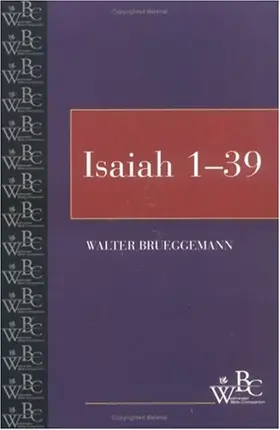

Isaiah 1–39
in Westminster Bible Companion
Pages
312 pages
Publisher
Westminster John Knox
Published
10/1/1998
ISBN-13
9780664255244
Collections
This book appears in the following featured collections.
- Top Old Testament Commentaries by Engaging Scripture (Nijay Gupta's Substack)
Reviews
Canonical approach focused on ascertaining how the text speaks with power to modern realities.
[Full Review]
Louisville, Kentucky: Westminster John Knox Press, 1998. Pp. x + 314, Paperback, $20.00, ISBN 0664255248. Volume: 1 Stephen T. Hague Newville, PA 17241 Brueggemann calls his canonical method of treatment an "open-ended" theological interpretation. Each subsection begins with a helpful geopolitical, historical, and theological summary, followed by running commentary structured according to his outline. He generally assumes that historical contexts and theological meaning of the texts are often only loosely linked, due to the perceived, rigorous "reshaping" of the historical material. He attempts to resolve disputes about dating by noting a canonical arrangement that involves a single, bifocal theological affirmation of exile and homecoming or judgment and deliverance of God. Texts traditionally understood as prophetic and messianic he generally interprets as "Christian imagination" or "rereadings": for example, the "great light" promised in 9:2 is simply "relief from oppression" not predictive. Isa 4:2-6, about a future age of the Branch of the Lord, reflects postexilic redacting of future themes back into the early chapters. Regarding the Branch in 11:1-16, he says, "We are here not to think of the later trinitarian categories of the church. . . ." Isa 9:1-7 is often taken as a "rehearing" of the story in the light of Jesus, but it is not in any way predictive. Further, the depiction of the Righteous King in Isaiah 11 is a public policy statement ("social possibility") for earthly kings and leaders, although it did become Jesus' own standard of righteousness and justice, and thus the cause of his death. (See similarly on the Servant in Isaiah 52-53, pp.13, 42, 140-150.) Although Brueggemaun disparages "predi ctive" readings, he proposes that multiple meanings/readings are warranted. He regularly makes note of divergent interpretations and readings of particular texts, in which he often offers a third position (for example, the Immanuel prophecy of Isaiah 7 has been read either historically or christologically, but he suggests we focus on the offer of faith.
[Full Review]

